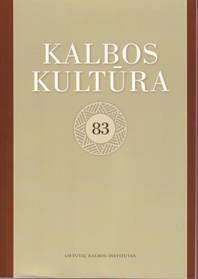Linksnių vartojimas veiksmažodžių abstraktų junginiuose
The use of cases in abstract phrases of verbal nouns
Author(s): Rasuolė VladarskienėSubject(s): Baltic Languages
Published by: Lietuvių Kalbos Institutas
Summary/Abstract: The aim of the article is to discuss phrases with verbal nouns denoting actions and describe the problematic uses of cases observable in the official administrative discourse. The focus of attention is on derivatives containing the most productive suffix, i. e. -imas (-ymas). The analysis of verb phrases and respective noun phrases has shown that the names of various actions most often occur in phrases with the genitive case. This case form replaces the nominative and accusative cases, sometimes even prepositional constructions, of the primary verb phrase that expresses relations between the verb and subject, object and sometimes adverbials. The dative case of the primary verb phrase is usually preserved though in certain cases the dative of the noun phrase originates from the accusative or other cases of the verb phrase. The instrumental and locative cases as well as prepositional constructions usually do not change.Language users are not familiar with the patterns of transformation of word phrases from nominal to verbal and, in dubious cases, they tend to prefer phrases with the genitive case. It is important to bear in mind though that when nouns are derived from verbs with the suffix -imas (-ymas) the combinability of the verb largely determines the structure of the noun phrase. Hence, the accusative and nominative of the object of the verb becomes the genitive of the noun phrase while the other cases usually do not change in such transformations. When a noun is derived from a verb by adding other suffixes and inflections, the patterns of syntactic transformation are not very strict.
Journal: Bendrinė kalba (iki 2014 metų – Kalbos kultūra)
- Issue Year: 2010
- Issue No: 83
- Page Range: 173-184
- Page Count: 12
- Language: Lithuanian

